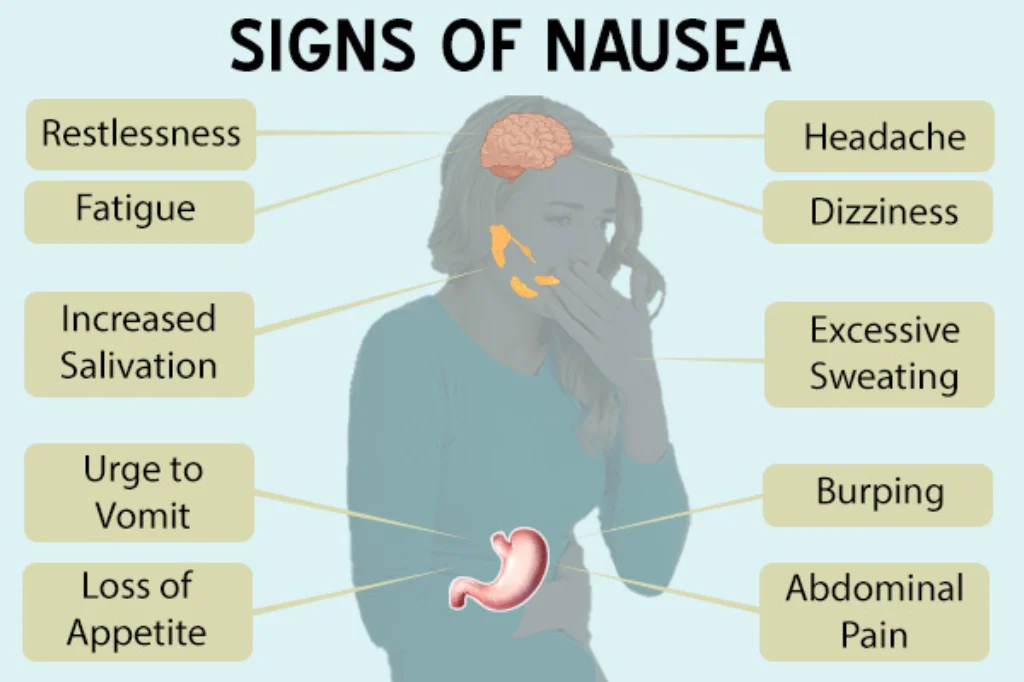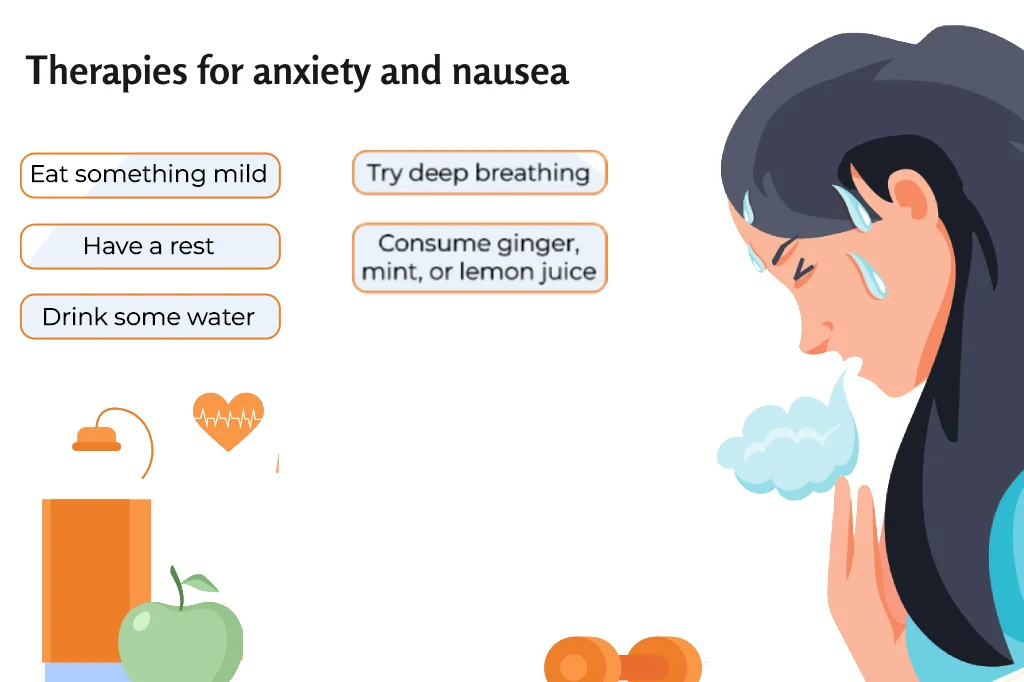Have you ever felt nausea during any frightening or stressful situation? If yes, then you might be suffering from nauseous anxiety. Anxiety is a feeling of fear and tense emotions. A person suffering from anxiety disorder faces difficulty in getting through all day. Moreover, anxiety not only affects the body’s physiological condition but also affects behavior. Anxiety can also adversely affect the digestive system and result in various gastric issues and nausea. However, if you are wondering, can anxiety cause nausea, read this article thoroughly. Moreover, you will also get familiar with how can anxiety make you feel sick. There is a greater possibility that you experience anxiety attacks and nervousness at the same time? Therefore you should be familiar with all coping strategies.
Can anxiety make you nauseous?
Anxiety is a normal body reaction to different life-distressing situations. A person with anxiety or panic attack can experience nausea which is also a major symptom of anxiety attack. Anxiety involves the stimulation of the body’s stress response system. Specifically, the sympathetic system gets activated which in turn stimulates the fight or flight response. Moreover, different chemical messengers are also released in the body which prepares the body to deal with different stress situations. Likewise, various other negative alterations also occur in the body. If the situation persists, then it can lead to various severe medical conditions.
How to identify the nausea condition?
You should have a clear insight about the topic: Can anxiety cause nausea? Nausea is quite an irritating condition. There is nothing worse when the person is unaware than what is the major cause of nausea. Although, individuals can identify anxiety conditions due to aggression. However, most people fail to diagnose the actual cause of the nausea condition. Likewise, anxiety doesn’t have to always result in nausea. Most people remain protected from nausea. Nausea depends on the extent and duration of anxiety attacks. If you are suffering from anxiety for a longer period, there is a greater likelihood of getting nausea again. Similarly, nausea resulting from the anxiety also elevates the anxiety.

What conditions are caused by anxiety?
Anxiety results in various physical responses that clearly explain that can anxiety cause nausea such as:
- Fatigue
- Hyperventilation
- Sense of danger
- Lack of ability to control worries
- Tiredness
- Sweating
- Headache
- Body ache
- Gastrointestinal issues
- Insomnia
- Muscle twitches
- Unconsciousness
- OCD symptoms
Can anxiety make you feel sick?
Persons with anxiety feel that they are sick and unable to participate in any productive activity. As the brain is connected with the digestive system, various gastrointestinal issues also occur. In most cases, upsetting a stomach is also considered a nauseous condition. Moreover, in some cases, an anxiety disorder that causes vomiting should also be considered. However, if you think that your digestive issues are becoming chronic and if you truly wonder, can anxiety cause nausea, then you should immediately consult an expert for effective treatment.
What does the person feel during nausea?
Anxiety results in the nauseous condition in which a person experiences aggravated conditions. Moreover, undesired sensations also occur in the abdominal cavity. Similarly, nauseous anxiety also results in some other conditions and can anxiety cause nausea such as:
- Hopelessness
- Depression
- Irritability
Can anxiety make you feel sick all the time?
A person suffering from anxiety can experience nausea anytime and anywhere. In addition, if the person is already having any disorder then symptoms can also worsen under the influence of nauseous anxiety. Just stress factors are responsible for the onset of nausea in anxiety conditions. Moreover, you should also be familiar with whether anxiety can cause morning sickness or not.
When the person wakes up in the morning and suddenly comes across any stress factor, nausea occurs. Similarly, most of people also get nauseous panic attacks before or after any meal. However, just a few minutes of relaxation then works better to overcome that unfavorable situation. Affected individuals also get some symptoms of eating disordersandADHD.
Can anxiety cause chills and nausea?
Anxiety causes various physical symptoms such as chills. Analysis of physical symptoms can assist you to determine the context of the topic: Can anxiety cause nausea? People also experience constant shivering. Moreover, shaking hands is also common. Some other common symptoms include sweating and cold flashes. In some cases of anxiety, body temperature is increased. While on the other hand, chills also occur. Anxiety chills are common in different types of anxiety such as flying phobia.
How to stop nausea from anxiety?
Although anxiety and the resulting nausea make you feel sick, there are some things that you can do to control this condition. By employing all the below strategies, you can prevent the condition that relates to the topic of: Can anxiety cause nausea?
Coping strategy with anxiety
The first step is to control the anxiety that causes the nausea. Therefore, think about those factors that trigger the stress symptoms. In addition, find out the causes that make you feel sad or anxious. Then prepare your mind to deal with that stressful situation. What you need to do is to relax your mind. Moreover, you can perform simple breathing exercises to give a soothing effect to your brain and soul. Similarly, if you think that your anxiety is taking control of your body, then it distracts your mind. You can listen to or watch anything interesting that causes the release of happy hormones in your body. Automatically, your body will send a signal to your brain that you are out of danger. So relax and cheerfully enjoy the moment.
Furthermore, you can also perform some physical workouts to relax your body’s muscles and the brain. Make a schedule to perform the daily exercises to remain active and healthy. Likewise, a healthy and balanced diet matters a lot. Avoid taking foods that increase the blood cholesterol level. Also, avoid the intake of alcohol or any other beverages. Make a diet plan which only includes healthy fruits and vegetables. Furthermore, also focus on your sleep-wake cycles and make sure to get adequate sleep.
Read More: A Brief Guide to different types of OCD
Coping strategy for nausea (continued)
After getting rid of anxiety or panic attacks, think about those factors that direct you towards a nauseous condition. If you feel some discomfort in your abdominal cavity, you can eat a small amount of any food product that gives you a sensation of pleasure. However, you should prefer to eat something dry like plain bread or any cookies. Similarly, drink water to relax your internal body systems. If you are standing then immediately sit down or move towards any place that gives you a soothing effect.
Medications
To treat anxiety and the resulting symptoms, different medications are recommended by the experts. Medication management is also considered feasible to prevent the disorder. If you want to stay secure from the conditions that can anxiety cause nausea such as:
Beta-blockers
Beta-blockers are specialized medicines that reduce the speed of elevated cardiac rate and blood pressure. Moreover, they are mostly recommended during stage fright.
Anti-anxiety drugs
Benzodiazepines are anti-anxiety drugs that diminish the symptoms of anxiety. However, people get addicted to their intake. Therefore, doctors usually avoid recommending these medications. Some common and widely used anti-anxiety drugs include:
- Xanax
- Buspirone
- Klonopin
Antidepressants
Antidepressants effectively treat the anxiety or depression symptoms. They are considered the first line of treatment for chronic anxiety. The following antidepressants are widely used to treat anxiety symptoms:
- Celexa
- Luvox
- Zoloft
- Paxil
Therapies for Anxiety and nausea
Most healthcare providers also suggest different medications for anger management during anxiety attacks. However, there are also various non-medication therapeutic approaches to treat nauseous anxiety. Following therapies can provide relief from the undesired anxiety and nausea.

Cognitive behavioral therapy
This therapy is a type of psychotherapy. Cognitive behavioral therapy can prevent the condition that causes nausea through anxiety. This therapy involves direct communication between mental health experts and affected persons. Moreover, talk therapists guide the persons on how to cope with life obstacles in their free time. They also guide them on how to alter their thoughts in a significant manner. Instead of just thinking about the stress factors, their brain adapts to the distressing situation and focuses on overcoming strategies.
Exposure therapy
This therapy involves the exposure of a person to the things, situations, or activities that result from fear. Initially, a person gets anxiety attacks after facing the situation. However, after a few therapy sessions, an affected person gets addicted and then ignores the situation
Read More: A Remarkable Guide to ADHD Telehealth
Acceptance and commitment therapy
It is also a renowned type of cognitive behavioral therapy that primarily focuses on reducing the symptoms of anxiety attacks. The main goal of this therapy is to train the brain to accept the situation and resulting thoughts. Moreover, persons with anxiety and nausea do not judge their surroundings and simply focus on taking action to prevent nauseous anxiety. With this therapy, a person learns that they should not strongly attach to their feelings or emotions. They only think that all the undesired intrusive thoughts are not based on fact. They only have to learn those skills that make them comfortable in the presence of others. Acceptance and commitment therapy also develop those skills that assist the person to socially interact with everyone. Various recent studies have reported the effectiveness of this therapy against numerous mental health disorders.
Dialectical behavioral therapy
Dialectical behavioral therapy is considered a significant tool to treat or manage anxiety and nausea. In this therapy, the main goal is to improve the physical symptoms associated with anxiety. This therapy can strongly alter hormonal dysregulation. Furthermore, dialectical behavioral therapy provides positive outcomes when other therapies are not effective.
Psychodynamic psychotherapy
In this therapy, mental health therapists focus on the causes of anxiety and nausea. This is achieved through self-examination. In most cases, anxiety that results from post-traumatic stress disorder can also be treated with this therapy.
Concluding remarks
Anxiety is a natural response to any fearful situation. Stress or anxiety prepares the body to deal with different emergencies. Moreover, some hormones affect the functioning of the gastrointestinal tract. Various gastric issues occur which results in an uncomfortable sensation in the abdominal cavity. Moreover, anxiety also results in nausea. Both the brain and digestive system are associated with each other. Therefore, an anxious brain state results in a nauseous condition. At Inland Empire Behavioral Group, you can find the best mental health experts who can effectively treat your anxiety and nausea. You can find all the strategies to cope with the situation that relate to our topic: Can anxiety cause nausea?
